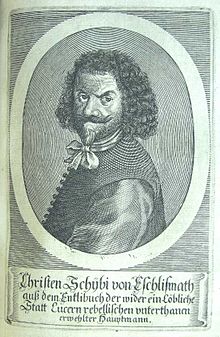Christian Schybi
Christian Schybi (also Schibi) (* around 1595 in Escholzmatt , Entlebuch office , Canton Lucerne ; † July 7, 1653 in Sursee ) was governor and leader of the Lucerne subjects in the Swiss Peasants' War .
Christian Schybi was initially in the service of the Lucerne captain von Fleckenstein for a few years and then worked as an innkeeper in Escholzmatt and Entlebuch. In Savoy he had learned a number of tricks based on agility and speed. Because of these tricks and his enormous physical strength, he was widely known and feared as the "sorcerer". Allegedly, Schybi is said to have lifted a man with an outstretched arm and once shouldered a horse.
The economic crisis after the end of the Thirty Years' War and the devaluation of coins gave rise to the Entlebuch revolt against urban rule. In contrast to the rich farmer's leader Hans Emmenegger, Schybi was one of the losers of the economic crisis and, like all landlords, suffered particularly from the new taxes. When the Bern gentlemen threatened to set up a border guard against the Entlebuch to keep the Bernese farmers away from the Entlebuchers, Schybi formed five hundred club bearers and marched through Entlebuch to the delight of the population.
In the 17th century there was still no separation of powers in the Confederation; the Lucerne City Council was a legislative, law-enforcing and judicial authority rolled into one. The freedom-loving Entlebuchers and their allies no longer wanted to tolerate a government that did not need to justify itself to them. On February 10, 1653 the Entlebuchers moved to the pilgrimage site Heiligkreuz and on the 26th Hornung (February) they confirmed their demands in the federal letter of the X offices of the city of Lucerne to the city of Lucerne and swore the Wohlhuser Bund . This gave the prelude to the Swiss Peasants 'War of 1653. In this Peasants' War, Christian Schybi from Escholzmatter was the military leader of the Lucerne farmers.
After the battle near Wohlenschwil , the peasant leaders Niklaus Leuenberger and Christian Schybi signed the Mellinger Peace on June 4, 1653 . However, the ruling governments did not abide by the treaty or declared it invalid and used their military advantage to punish and retaliate after large parts of the peasant army had already disbanded. Schybi fought his last big battle on June 5th at the Reuss Bridge in Gisikon . However, this could not stop the collapse of the peasant uprising in Entlebuch and Emmental . Schybi was arrested on June 21 by Colonel Sebastian Bilgerim Zwyer von Evibach from Uri, an ally of Lucerne, tortured for his “ witchcraft ” and beheaded with the sword on July 7, 1653 in Sursee .
A monument, created by Paul Amlehn , unveiled on the village square of Escholzmatt in 1903, in the 250th anniversary of the Swiss Peasants' War, keeps the memory of Christian Schybi and Hans Emmenegger, provincial tension master and fellow campaigner, alive to this day.
literature
- Hans Mühlestein : The great Swiss peasant war . Celerina 1942. Reprint: Unionsverlag, Zurich 1977, ISBN 3-293-00003-7
- Hans Nabholz : The Schybid Monument in Escholzmatt In: Schweizer Illustrierte , Vol. 7, 1903, pp. 450–454. ( e-periodica )
Web links
- Gregor Egloff: Christian Schybi. In: Historical Lexicon of Switzerland .
- Schybi run
- 350 years of the Swiss Peasants' War (PDF file; 2.25 MB)
- Peasants' War 1653 - Escholzmatt Landscape Theater 2003
Individual evidence
- ↑ Regarding the different dates of death: The date July 7th coincides with the date of death from the book by Hans Mühlestein . According to Mühlestein, there should be a letter from Councilor Kaspar Pfyffer to the mayor Fleckenstein, in which he reports about the torture of Schybi. This letter is dated July 5, 1653. The picture by Martin Disteli depicting the torture before the court martial in Sursee (Swiss picture calendar 1840) indicates the day of death as July 9, 1653 ( Gregorian calendar ). According to this, Schybi would have still been alive on the date of death indicated in the picture with his portrait ( June 27, 1653).
| personal data | |
|---|---|
| SURNAME | Schybi, Christian |
| ALTERNATIVE NAMES | Shibi |
| BRIEF DESCRIPTION | Swiss peasant leader |
| DATE OF BIRTH | around 1595 |
| PLACE OF BIRTH | Escholzmatt , Canton of Lucerne |
| DATE OF DEATH | July 7, 1653 |
| Place of death | Sursee |


